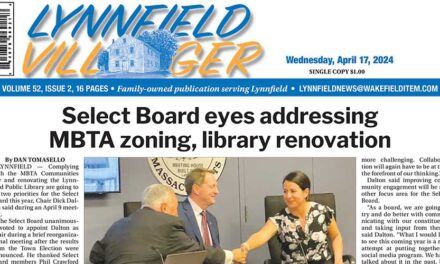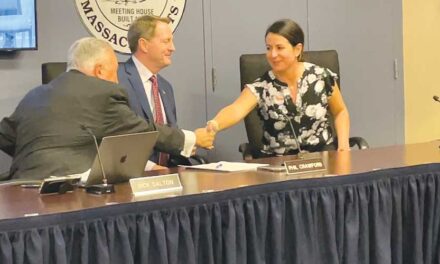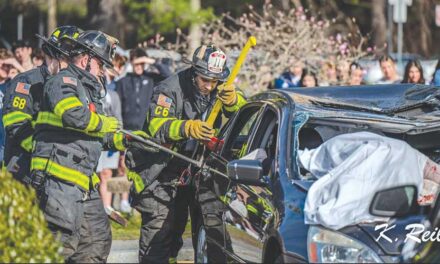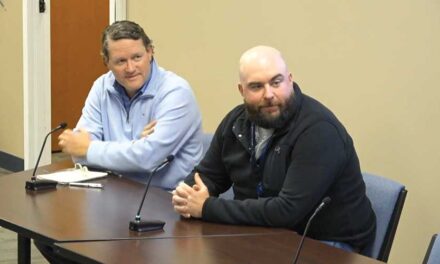Published November 14, 2018
By DAN TOMASELLO
LYNNFIELD — The Lynnfield Center Water District Board of Water Commissioners was given an earful on Nov. 7 about a proposal designed to address discolored water and supplement the district’s water supply.
The water commissioners have scheduled a special district meeting for Monday, Dec. 10, which will ask ratepayers to approve the proposed Glen Drive greensand filter plant project as well as approve allocating $250,000 for a supplemental water supply study.
CDM Smith civil engineer Angela Moulton gave an overview of the proposed project and the warrant article to be voted on at the special district meeting. She noted the district has four well sites for the district’s water supply, which is groundwater. She said the LCWD’s Glen Drive and Main Street well fields get their water from the Ipswich River Basin, while the Phillips Road well field gets its water from the North Coastal River Basin.
“The Ipswich River Basin is considered a stressed basin, which means during summer months there are other surrounding communities that are also pulling drinking water from this river basin,” said Moulton. “When those levels get low, that triggers different types of watering bans mandated by the Massachusetts Department of Environmental Protection.”
Moulton noted the Glen Drive well field was built in the 1990s. She said 40 percent of the town’s drinking water comes from the Glen Drive well field, 40 percent comes from the Phillips Road well field and the remaining 20 percent comes from the Main Street well field.
“Glen Drive is a major contributor to the entire district’s drinking water supply,” said Moulton.
While Moulton said the water quality at the Glen Drive well field was “very high” during the 1990s, she said residents living in the Apple Hill Lane, Chestnut Street, Cortland Lane and Lowell Street areas of town have been experiencing discolored water that the district has attributed to iron and manganese.
In order to address the problem, Moulton said the water commissioners have crafted a warrant article containing two different components for the special district meeting on Dec. 10. The first proposal will ask LCWD customers to approve constructing the greensand filter plant in order to treat iron and manganese.
“This would remove the manganese that is in the water,” said Moulton.
Moulton said the proposed greensand filter plant currently has a $5.25 million price tag. If voters approve the project, Moulton anticipates the plant will be up and running in 2020.
CDM Smith civil engineer Carol Rego said if the problem does not get addressed, manganese will spread throughout the district and more residents will have discolored water.
“It will affect more areas as time goes on,” said Rego. “The plant would be designed to handle increased levels of manganese.”
Moulton said the warrant article’s second component involves appropriating $250,000 in order to conduct a study on supplementing the district’s water supply. She said additional water sources could help alleviate watering bans during the summer that have frustrated a number of residents.
“Additional sources of water could come from surrounding towns, additional wells at existing sites or could be MWRA water,” said Moulton. “But in order to get there, there needs to be a study to determine what is the best way for getting an additional water supply.”
Moulton explained how the vote on the warrant article would work.
“A yes vote addresses water quality at Glen Drive and will provide funding to study additional sources to supplement the district’s water,” said Moulton. “A no vote means no water quality improvements at Glen Drive and no funding to study additional water sources.”
Moulton said the water commissioners will be giving another update on the project during the board’s next meeting on Monday, Nov. 26, beginning at 6:30 in the LMS cafeteria. The water commissioners will be closing the warrant for the special district meeting during the Nov. 26 meeting.
Proposal infuriates residents
The majority of the 10 residents in attendance were frustrated with the way the warrant article is crafted and the lack of time people have to learn about the two proposals.
A woman in the audience inquired why the LCWD decided to schedule the special district meeting on Dec. 10.
“There is a lot of people in the district who don’t know about this,” the woman said. “My neighborhood is not currently impacted. I am just wondering why we have to vote on Dec. 10. Can that be delayed a little bit so more people could get the information so they can make an educated decision and actually show up and vote?”
LCWD Water Commissioners Chairwoman Connie Lecesse noted residents were scheduled to receive a brochure about the proposals late last week and said ratepayers will have an opportunity to come to the board’s Nov. 26 meeting.
“We will be available and people can call the district,” said Lecesse. “It gives them six weeks to review the mailer and if they have any questions, they can call the district. The problem exists now. We have been listening to ratepayers with legitimate complaints about their water. We want to move forward to improve the quality of water. We are also hearing from other people who find the watering ban objectionable. While the greensand filter plant is the largest component, the second component is voting for money to study alternative sources of water.”
Another woman inquired why the district wants to invest $5.25 million “on a basin that is stressed.”
“Why don’t we hold off on that and just do the study?” she asked.
Lecesse said the two components “go hand-in-hand.”
“This new filtration plant will filter all of the water going to all of the homes,” said Lecesse. “It will maintain the quality of water at a very small cost to ratepayers. And it will also allow us to seek alternative sources for water. Under the existing system, we will never be able to lift the watering ban.”
In response, the woman said joining the MWRA would “solve all the problems.”
“It would solve the stress, there would be no ban and we would have water quality,” said the woman. “Why aren’t you giving us what we want?”
Lecesse said the water commissioners and CDM Smith engineers have discussed the issues at length.
“This is the plan that is on the table,” said Lecesse. “We are responding to the majority of ratepayers. We cannot respond to the minority.”
The same woman also inquired what is the district’s “plan B” if the warrant article fails. LCWD Superintendent and Water Commissioner Ken Burnham said the district would continue its directional flushing program.
“This is a DEP-approved method,” said Burnham. “We will continue to do that twice a year. During the summertime, we won’t have the availability to do that.”
Wymon Way resident Rob Almy asked if the district’s feasibility study on the two proposals will be made available for public review before the Dec. 10 meeting.
Lecesse said the board will discuss the request.
“Madam chair, for six weeks I have been asking you to be able to review the materials behind all the work,” said Almy in response. “I have a history of managing a water agency. These are the kind of things I am interested in seeing and I am a ratepayer in the district. I hoped I wouldn’t have to ask this question in an open hearing.”
Russet Lane resident Stephanie Rauseo said it would be “prudent to separate the two phases.” She said she would be reaching out to LCWD attorney Chris Casey about creating an additional warrant article pertaining to just the study.
“I am very upset you have linked the two phases together,” said Rauseo. “I think we should have a choice. I am worried it’s not going to get passed.”
Burnham said creating a separate warrant article is Rauseo’s “prerogative”
“That is why the warrant was opened,” said Burnham. “Residents can put their own article in. We proposed that they go jointly so we can move forward jointly. This is a problem that has to be addressed to rectify the situation. The more we delay putting that filter in, it’s going to affect more residents in the district.”
Cortland Lane resident Kevin Prouty said, “Common sense would say that you do a study first, not while you are spending $5 1/2 million dollars.”
“I respectfully disagree,” said Lecesse. “We have employed common sense prior to this by having our engineers study the problem and what can correct the problem.”
Former Selectman David Nelson urged the water commissioners to delay the special district meeting.
“I think something needs to be done, but I think it’s a little premature to be having a vote on Dec. 10,” said Nelson. “The people who have been involved in these meetings are here and they still have questions that they feel are unanswered. I will be very blunt with you. I have talked to people who have no idea this is going on. I think there should be more information about the different options.”




